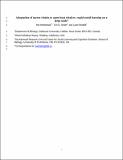Adaptation of sperm whales to open-boat whalers : rapid social learning on a large scale?
Abstract
Animals can mitigate human threats, but how do they do this, and how fast can they adapt? Hunting sperm whales was a major nineteenth century industry. Analysis of data from digitized logbooks of American whalers in the North Pacific found that the rate at which whalers succeeded in harpooning ('striking') sighted whales fell by about 58% over the first few years of exploitation in a region. This decline cannot be explained by the earliest whalers being more competent, as their strike rates outside the North Pacific, where whaling had a longer history, were not elevated. The initial killing of particularly vulnerable individuals would not have produced the observed rapid decline in strike rate. It appears that whales swiftly learned effective defensive behaviour. Sperm whales live in kin-based social units. Our models show that social learning, in which naive social units, when confronted by whalers, learned defensive measures from grouped social units with experience, could lead to the documented rapid decline in strike rate. This rapid, large-scale adoption of new behaviour enlarges our concept of the spatio-temporal dynamics of non-human culture.
Citation
Whitehead , H , Smith , T D & Rendell , L 2021 , ' Adaptation of sperm whales to open-boat whalers : rapid social learning on a large scale? ' , Biology Letters , vol. 17 , no. 3 , 20210030 . https://doi.org/10.1098/rsbl.2021.0030
Publication
Biology Letters
Status
Peer reviewed
ISSN
1744-9561Type
Journal article
Collections
Items in the St Andrews Research Repository are protected by copyright, with all rights reserved, unless otherwise indicated.

